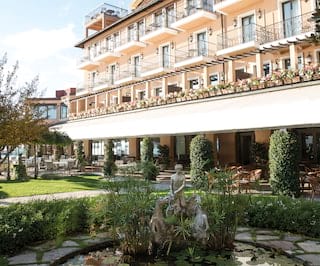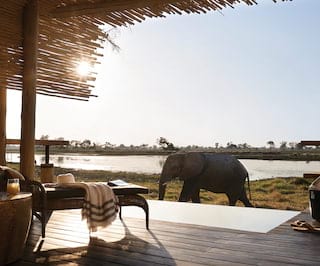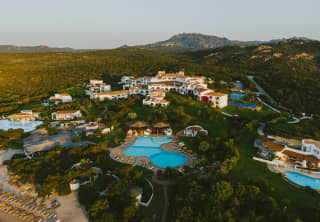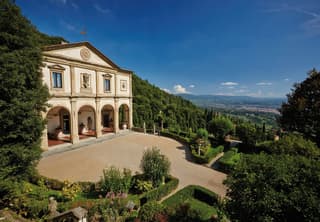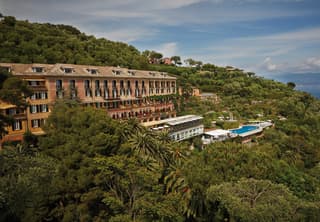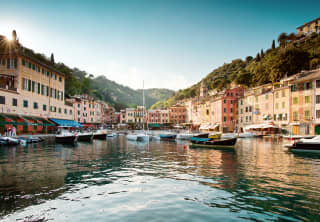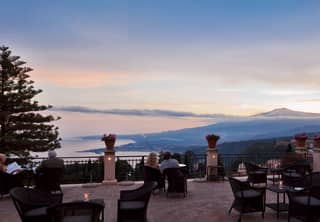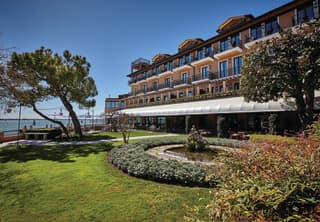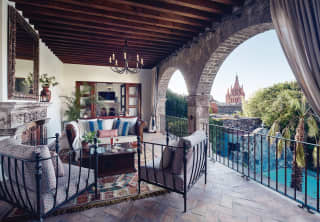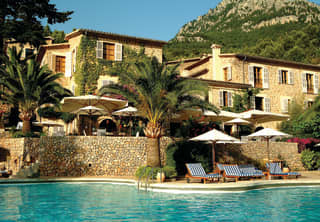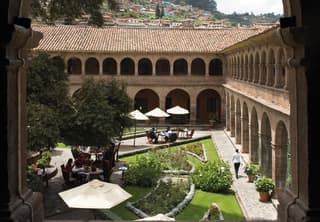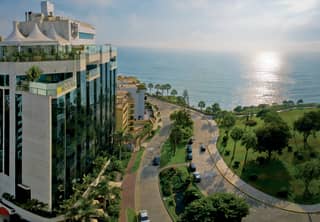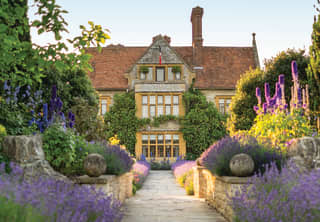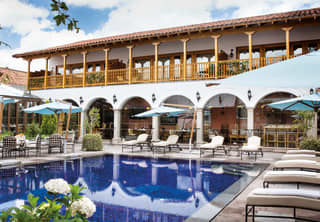Garden Gastronomy
Article
The Roots of Taste
Among blooming gardens and beneath a blissful blue sky, an annual garden party at Le Manoir aux Quat’Saisons celebrates the summer—and shines a light on the hotel’s deep roots in garden gastronomy.
By Daniel Hayden
“Of course, at Le Manoir it is all about the food” Raymond Blanc tells the assembled guests, standing proud in his garden in front of a wreathed display of red, white and blue balloons. “But it is also very much about the gardens, and here the two are impossible to separate.”
It is Bastille Day—or quatorze juillet, as I’m told by some of the resident Francophones. Epicureans from across the country have gathered on the verdant lawn for this annual party; a jewel in the crown of Le Manoir’s summer season and one of the best ways to experience Oxfordshire in all its beauty.
It is in many ways a multifaceted celebration. The significance of the day ties back to Chef Patron Raymond Blanc’s proud French roots, honoured again in the tricolore rosettes worn by many of the guests and the effervescent notes of La Marseillaise expertly picked out by the Oxford Philharmonic Orchestra. It is a salute to Britain, Raymond’s adoptive home for the past four decades—elegantly patterned deck chairs set out across the lawns and gardens are something of an English icon, especially when combined with the strolling acoustic band playing gentle reinterpretations of Brit-Pop classics as the stars come out and the fires are lit. But above all else, it is a celebration of Le Manoir’s food, the gardens, and the inextricable link between locality and exceptional cuisine.
Raymond’s speech is an invitation to the assembled guests, encouraging them to journey from the main lawn and to explore the hotel’s gardens. To discover the beauty of the classical English water garden and the Fugetsu-An Japanese tea house; to find the hidden seating areas and the surprise entertainment hidden among the trees and hedges. And most importantly to discover the incredible variety of produce in bloom, from the staggering selection of vegetables and herbs grown in the kitchen gardens, greenhouses and cloche tunnels, to the mushroom valley and heritage orchard rich with apples, pears, sloes and plums.
The gardens are the beating heart of the restaurant; they always have been. Raymond was not just an early adopter of the garden to plate philosophy, but one of its pioneers. His holistic approach to the restaurant meant that foraging, seasonality and zero waste were in Le Manoir’s DNA long before they were the terms de jour in culinary journals. His personal ethos earned the restaurant two Michelin stars shortly after opening, and they have held onto them for almost 40 years. This deep-rooted passion for locality and sustainability was further lauded in 2021 when the hotel received one of the Michelin guide’s first green stars.
As the name implies, whenever you visit Le Manoir aux Quat’Saisons you are sure to taste the season—the best of the garden whipped into spellbinding dishes with an almost mesmeric creative passion. Today is no exception. Back on the main lawn, we are all spoiled with myriad taster dishes that showcase the skills of Raymond’s well-seasoned team and the garden’s bounty.
Oyster leaves are paired with pickled daikon radish to recreate that addictive, briny taste of the sea. Homegrown aubergines are barbecued to perfection, drizzled with rose harissa and served with an umami-rich earthy houmous. Steak tartare and pistachio does not feel out of place on a sun-splashed lawn when paired with a delicate quenelle of bright mint sorbet. The bowl of vibrant green summer risotto, complete with sliced mini courgette, radish, and edible flowers, is the very picture of summer.
But despite their efforts, these hard-working gardens cannot provide everything the kitchen needs. For this, Raymond and his team have forged strong relationships with some incredible local suppliers. Many of them are set up on the fringes of the lawn for today’s party, introducing guests to their products with an inescapable passion. Of all the things to do in Oxfordshire, from the nearby verdant Cotswolds to Blenheim Palace, Bicester and beyond, Le Manoir is perfectly positioned to explore the bounty of the surrounding area.
Many of the suppliers can be credited as being in the vanguard of Le Manoir’s culinary legacy. Johnny, founder of the Valley Smokehouse, has been working with Raymond for more than 25 years; using his expertise to bring the best flavours out of his ethically sourced Loch Duarte salmon. Eric Charriaux, founder of Premier Cheese, has also been working cordially with Raymond for around the same length of time, ensuring the restaurant is always stocked with the best artisanal cheeses.
It isn’t all heritage, however. Raymond and the team have set their sights on writing the culinary legends of tomorrow, and are working with expert domestic producers who are revolutionising their respective industries. The Hundred Hills vineyard is only a short drive away from the hotel, and within two years of launching their first labels they are now found on the menus in half of the country’s three Michelin-starred restaurants. This family-run venture is dedicated to quality and sustainability, and they feel that Raymond has been personally invested in their journey from the beginning. This strong relationship means that guests at Le Manoir are now some of the few who are invited to visit the vineyard in person.
Orbiting the lawn, beneath blue skies and in the shade of the honey-hued manor house, we get to meet many of these individual producers. Each has a fascinating story to tell, and something delicious to sample. But at the root of each story there resonates a shared respect—for each other, for provenance, and for what exciting new tastes and trends await on the horizon.
“We must change the way we eat,” Raymond says. “Food is now key to British culture, and that requires knowledge. We must be aware, demanding and selective. To break away from the norms and systems that are creating such a problem for our environment. Of course chefs need to be connected to the producers and the consumers. We must be caring and soulful in the kitchens and put that heart on display. We are in the middle of a revolution—a revolution that perhaps was slower than it should be. But the world is changing and it’s very exciting.”
